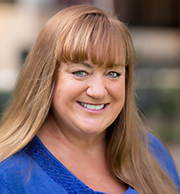
From the Chair: Time to Stretch Your Comfort Zone
By Cindy Topdemir, Ph.D. | May 2022
 The end of the year is approaching and the busyness that comes along with it! This month I am including a few ideas to stretch your comfort zone. As school counselors, we can model having a growth mindset for our students and staff by trying something new, too.
The end of the year is approaching and the busyness that comes along with it! This month I am including a few ideas to stretch your comfort zone. As school counselors, we can model having a growth mindset for our students and staff by trying something new, too.Being able to understand and respect a viewpoint that is different than ours is not always easy. Teaching students to take someone else’s perspective into consideration can be done through role plays, reading stories, empathy cards and other activities to discuss feelings. These are fun ways for students to learn how to think about differing viewpoints.
Critical conversations are ones that help us think about the world and our place in it. They may focus on equity, identity, bias, power and more. Have a goal in mind and set ground rules before starting these conversations in groups or classrooms. These can be done as a professional learning community (PLC) for staff, too. Students may have strong feelings during critical conversations and issues may emerge that may require follow-up or counseling. Make sure to reflect on your own feelings before beginning.
Incorporating and boosting technology in your school counseling program can save you time and increase your accountability practices. One technology tool to check out is Google Forms. You can create pre/post-tests, exit tickets, surveys and more. Data can be automatically disaggregated. Dropbox, like Google Drive, can be used to store and access your files from anywhere. Remind is a great app to use to send your middle or high school students or parents short reminders through texts. A final way to incorporate more technology into your program is to use social media to get information to your families.
Inequitable discipline practices should be addressed now for next year. Implementing programs such as restorative justice, PBIS or social/emotional learning offer tools to address this. School counselors can advocate for changes regarding discipline practices by using the school’s data. Discussing these inequities may not be the most comfortable conversation, but it is an area where school counselors can lead the charge.
Another way to stretch your comfort zone and grow is through leadership. Being a leader can be learned and developed. It is also a mindset. For example, we’ve all heard the saying, “Fake it till you make it.” Being able to share how your program aligns to your school’s goals and using data to do so will show the importance of your position. School counselor leaders advocate not only for their role but also for their students and equity. To develop as a school counselor leader, it is important to be involved in your state association, the Florida School Counselor Association. You can begin by joining a committee or applying to become an Emerging Leader in our leadership development program.
I hope the ideas in this article resonate with you and you can “Stretch Your Comfort Zone” and grow professionally by trying at least one!
Contact Cindy Topdemir, Ph.D., Florida School Counselor Association Governing Board chair, at topdemir@fla-schoolcounselor.org.